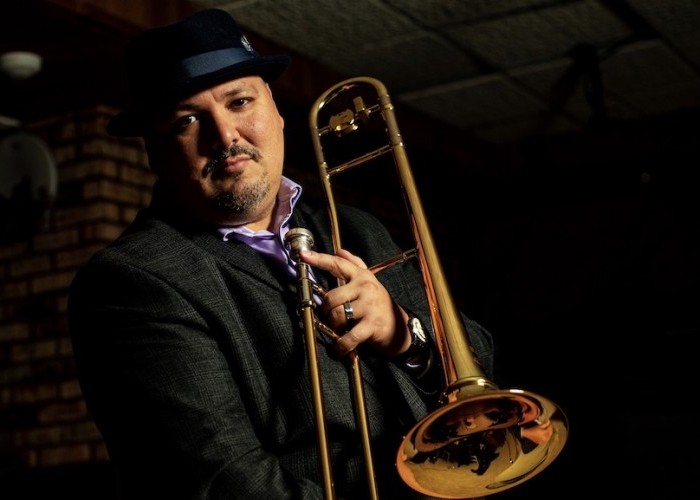Jan 13, 2026 2:09 PM
More Trump-Kennedy Center Cancellations
The fallout from the renaming of the John F. Kennedy Center for the Performing Arts to include President Donald…

Michael Dease is the Trombonist of the Year in DownBeat’s 69th Annual Critics Poll.
(Photo: Jessica Cowles)Michael Dease took a circuitous route to discovering his chosen instrument. He started out as an alto saxophonist during high school, occasionally playing a little trumpet.
“My heroes at that time were Grover Washington Jr. and Maceo Parker,” he said by phone from his home in Ohio. “I really had never heard any swing.”
But his mother, originally from Brooklyn, pointed him toward jazz.
“She said, ‘You can’t play saxophone and not know about Bird.’” His jazz journey eventually led him to John Coltrane, and “I really fumbled at it until I heard Curtis Fuller play on ‘Blue Train.’ … I was a saxophonist, and by the end of his solo on ‘Blue Train,’ I was a trombonist.” He switched instruments the next day, and has never looked back.
Dease took to the instrument with remarkable speed. “I did not know it was hard,” he says. “As soon as I got a trombone, I figured out the notes by ear and then I just counted down the slide. The first day I [ran scales] and everybody looked at me like I was crazy.
“From there, I started learning J.J. Johnson and Curtis Fuller solos by ear and playing along to the records. That was probably weeks two and three. And I was playing every day. I remember waking up at about 2 in the morning, afraid that I had rolled over on my trombone.”
After releasing three albums independently, Dease began recording for Posi-Tone Records with 2014’s Relentless. He’s made eight albums for the label to date, and appeared on many others as a sideman, part of label co-founder Marc Free’s efforts to build a stable of players in the manner of classic labels like Prestige and Blue Note. It’s an artistic fraternity of sorts, a mutually supportive network, and Dease is proud to be a member.
“I always enjoy the sessions,” he said. “Posi-Tone has a strong focus on original music, so one session can be electronic, one session can be a retro look at some swing or bebop styles, but it’s always fresh and fun. I really respect what Marc is doing and how much freedom he gives the artists in choosing their direction and material and their story.”
Many of Dease’s albums are organized around a concept. All These Hands, from 2017, traced the path of jazz from south to north, from New Orleans to New York, expanding through the Midwest and the prairies in between. Individual tracks paid tribute to the contributions specific cities and regions made to the music, as titles like “Territory Blues,” “Chocolate City,” “Downtown Chi-Town” and “Memphis BBQ & Fish Fry” indicated.
His 2019 release, Never More Here, recorded with the same band (alto saxophonist Steve Wilson, pianist Renee Rosnes, bassist Gerald Cannon and drummer Lewis Nash), paid tribute to Charlie Parker in a sidelong way, by tracing Bird’s influence through the work of composers like Jimmy Heath, Jackie McLean, Billy Taylor, John Lewis and J.J. Johnson.
Dease’s latest album, Give It All You Got, came out in February. The music is straightahead hard-bop, with performances that mix slickness and grit and keep the energy level high at all times. Each of the album’s 10 compositions — six of which were written by Dease, one each by drummer Luther Allison and trumpeter Anthony Stanco, and two by organist Jim Alfredson — are thematically related to a two-week workshop Dease leads every summer at the Brevard Music Center in North Carolina. Some are tributes to fellow instructors, while others relate to aspects of the program or Dease’s attitude toward jazz education and bandleading.
That’s reflective of the trombonist’s belief that a jazz life is not only about individual success, but also about being part of a lineage. Just as he learned from Johnson, Fuller, Wycliffe Gordon, Steve Turre and others, Dease hopes to inspire younger players and pass on everything he’s learned.
“You can’t stop at just playing. You can’t stop at just touring or just teaching. You have to go the extra mile to ensure that the people behind you continue doing what the people ahead of you are doing — paying it forward and paying it back.” DB

Belá Fleck during an interview with Fredrika Whitfield on CNN.
Jan 13, 2026 2:09 PM
The fallout from the renaming of the John F. Kennedy Center for the Performing Arts to include President Donald…

Peplowski first came to prominence in legacy swing bands, including the final iteration of the Benny Goodman Orchestra, before beginning a solo career in the late 1980s.
Feb 3, 2026 12:10 AM
Ken Peplowski, a clarinetist and tenor saxophonist who straddled the worlds of traditional and modern jazz, died Feb. 2…

The success of Oregon’s first album, 1971’s Music Of Another Present Era, allowed Towner to establish a solo career.
Jan 19, 2026 5:02 PM
Ralph Towner, a guitarist and composer who blended multiple genres, including jazz — and throughout them all remained…

Rico’s Anti-Microbial Instrument Swab
Jan 19, 2026 2:48 PM
With this year’s NAMM Show right around the corner, we can look forward to plenty of new and innovative instruments…

Richie Beirach was particularly renowned for his approach to chromatic harmony, which he used to improvise reharmonizations of originals and standards.
Jan 27, 2026 11:19 AM
Richie Beirach, a pianist and composer who channeled a knowledge of modern classical music into his jazz practice,…